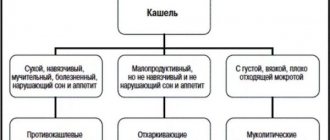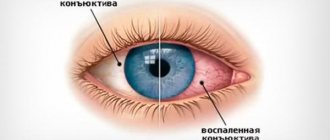In most cases, the very first thing parents notice when their child gets sick is a cough. At the initial stage, a cough can be alarming, after which it frightens, and if it is prolonged, it becomes completely annoying. Doctors can try all kinds of drugs from the pharmacy on a child, but the child continues to cough. What then should parents do?
The question arises: why is the doctor unable to cure a child’s frequent cough? The answer is obvious - doctors often act blindly more often than we notice. This may not make you happy, but the fact remains. Any doctor can only treat what he has heard or noticed. Pediatricians, for example, listen to the lungs, but cannot look at the nose and throat. But an ENT specialist can look at the throat and nose, but he doesn’t understand the lungs. The neurologist will tap your knee with a hammer, but will not look into your throat, much less listen to your lungs.
This suggests the conclusion that there is no doctor who can at one moment eliminate all the causes of cough. This means that you will need to look for a doctor who will immediately prescribe the correct course of treatment and make the correct diagnosis.
If we look at it in more detail, parents should choose the attending physician for their child themselves, so that at least time is spent searching for the causes of the cough. However, without skill and experience, not every parent will succeed. First, we advise you to understand what a cough is.
Signs of dry cough in children
A dry cough is also called non-productive because during it the mucus is not coughed up. Such a cough does not completely bring relief to the patient, but only aggravates an already serious and painful condition.
Productive or wet cough, which is accompanied by the removal of sputum with pathogenic flora from the body.
A nonproductive cough occurs due to the action of irritants on receptors located in the sinuses, bronchi, trachea and pharynx. The cough reflex can occur with any exposure to irritants on human receptors.
A lingering dry cough is extremely dangerous for a child; under no circumstances should you let the disease take its course! This is fraught with breathing problems and swelling of the child’s larynx.
In what cases does a dry cough develop?
It is worth considering the main conditions that are accompanied by a non-productive, dry cough:
- Respiratory diseases of viral origin.
The causative agent of the virus, entering the epithelial cells located in the respiratory tract, leads to the development of the inflammatory process and their death. This causes stimulation of receptors that provoke coughing.
- Inflammatory process in the vocal cords.
The diseases are associated with a decrease in the lumen in the glottis, and the nature of the cough depends on the degree of this phenomenon. It can be rude, “barking”, or quiet, and even silent. The causes of laryngitis may be a virus, bacteria, ligament strain, exposure to irritating components, or allergies.
- Specific infectious diseases caused by bacteria:
- Diphtheria - with the development of this disease, the pharynx, larynx and neck swell, and the trachea is compressed;
- Tuberculosis is accompanied by prolonged inflammation in the tissues of the lungs and paratracheal lymph nodes, one of the signs of which is a reflex cough.
- Whooping cough - waste products of bacteria provoke the activity of the cough receptor, which is expressed by bouts of prolonged coughing that can cause suffocation. In addition, with this disease, thick, viscous sputum accumulates in the bronchi, which is very difficult to cough up.
- Respiratory manifestation of an allergic reaction.
The child constantly coughs and sneezes and there is no increase in temperature. This happens more often when plants bloom, also when in contact with animals and other allergens.
- Pleurisy.
When the pleura becomes inflamed, a dry cough occurs and is accompanied by pain.
- Gastroesophageal reflux.
The occurrence of dry cough attacks is associated with the penetration of gastric contents through the esophagus into the oral cavity.
Among the rare causes of dry cough in children are:
- tumor formations in the lungs, mediastinum and bronchial lymph nodes;
- inflammatory processes in the respiratory tract caused by inhalation of harmful substances and dust;
- aortic aneurysm;
- defects of the heart muscle, which are called decompensated.
Drug treatment
Remember that cough never appears as the only symptom; its presence indicates a pathological process in the child’s body and its development. In this regard, the main goal of a pediatrician is not to eliminate and suppress symptoms, but to find the cause of why the baby is sick and treat it.
To alleviate constant coughing attacks and alleviate the child’s condition, the pediatrician prescribes medication. There are 2 types of drugs that fight nonproductive cough:
- Medicines that help with the discharge and expectoration of mucus and quickly convert dry cough syndrome into wet type. They are called mucolytics; children are prescribed such drugs only on a natural basis of plant origin. The mechanism of action of mucolytic agents is based on stimulating the cumulative effect of sputum and its removal from the body by expectoration.
- Medicines that suppress active processes in the cough center are called antitussives. It is not recommended to simultaneously treat cough with mucolytics and antitussive drugs.
If a non-productive cough does not go away, and high temperature and fever are added to this symptom, the pediatrician will recommend taking a course of antibiotics. Their action is aimed at suppressing the increased activity of pathogenic bacteria and microorganisms.
Under no circumstances should you self-medicate or prescribe medications to your baby! By such actions you endanger the life and health of your child. Only a qualified specialist, in this case a pediatrician, can make a correct diagnosis and prescribe effective treatment.
Frequently asked questions to the doctor
Recurrence of cough
We had a strong cough, we were treated for three weeks, then we went to kindergarten and two days later we were left at home again due to a strong cough. Tell me why is this?
Despite the fact that you have completed such a course of treatment, the process of removing toxins with sputum was still in the initial phase. During this period, the body is sensitive to stress, cold, and infections. Almost always in kindergarten there are these factors, which is why until the child is completely healthy he cannot be taken to kindergarten.
Traditional methods
If you are the type of parent who does not approve of your child taking medications, you can alleviate your baby’s condition with the help of folk remedies such as:
BADGER OR GOOSE FAT
Badger or goose fat has long been used to treat nonproductive cough in children. They are rubbed before going to bed (the legs, back, and chest area need to be rubbed); the child must be covered with a warm blanket so that he sweats well during the night. If the child is over 3 years old and amenable to persuasion, you can give 1 teaspoon of badger (goose) fat before meals or on an empty stomach in the morning.
If your baby flatly refuses to eat such a substance, use a little trick: warm the milk to room temperature, add 1 teaspoon of fat and a small amount of honey to it to improve the taste.
MUSTARD
Ordinary dry mustard powder is one of the most effective remedies that will alleviate the baby’s condition with severe cough syndrome. Mustard powder can be poured into the baby's socks and put on at night. They also make a foot bath with the addition of mustard (contraindicated for children under 3 years old!). To do this you will need:
- Fill a basin with 5 liters of hot water.
- Add 1 heaped tablespoon of mustard powder to the water and stir well.
- Make the child sit comfortably, dipping it ankle-deep in the basin.
- You can steam your feet for 10-15 minutes, then wipe them dry and put on warm socks.
Wet morning cough
The baby coughs a couple of times in the morning. After sputum is produced, the child stops coughing until the next morning. The most common causes of such a cough are expectoration of mucus that has accumulated in the nasopharynx and throat.
To treat such a symptom, it is necessary to contact an ENT specialist with a request to carefully examine the child’s nasopharynx and nose. After examining the child by a doctor, you should definitely ask about the presence of mucus in the nasopharynx or mucus flowing down the back walls of the nasopharynx. If the answer is positive, that same mucus is the cause of the baby’s cough.
What if the doctor’s answer is negative, and he answered that the child’s nasopharynx is clean? In this case, we ask about the presence of irritation or redness. If any are present, we go to a gastroenterologist.
How to ease the suffering of a patient
In addition to medication and alternative treatment, caring parents can make their child feel better by doing the following:
- In the children's room, air humidity should be 55-60%.
- The temperature in the room where the baby is located should vary between 20-21 degrees Celsius; a lower or higher temperature will become an additional irritant for the child’s respiratory tract.
- It is necessary to carry out wet cleaning daily and ventilate the room well.
- To soften the irritated mucous membrane, it is necessary to constantly give the child warm drinks.
- If a child has no appetite, do not force him to eat. During illness, all the body’s strength is spent fighting viruses.
- The last and most important point. Don't self-medicate! Strictly follow the pediatrician's recommendations, otherwise there is a high risk of complications of the existing disease.
A cough begins in the evening: what do such attacks indicate?
A person can feel absolutely healthy throughout the working day. However, upon arriving home in the evening, and only taking a horizontal position, he begins a reflex action with copious sputum production. Sometimes a completely different type of cough is observed - dry, intermittent, with wheezing and whistling. Evening cough, as evidenced by the following symptom:
- There is a reflex action that is absent during the day, and in the evening the symptom intensifies. This condition may indicate the presence of a chronic respiratory disease, for example, bronchitis, pleurisy.
- Reflex act with sputum discharge. This symptom accompanies a number of ailments: bronchial asthma, allergies, interstitial lung diseases.
- A dry, severe cough is a companion to occupational illnesses.
- During the reflex action, sputum is expelled, which contains bloody clots. This symptom is a sign of several diseases, including tuberculosis, heart failure, etc. To make a correct diagnosis, you need to know the average volume of blood released. Serological and other types of studies must also be carried out.
- The presence of bad habits. This category includes not only smoking cigarettes, but also hookah. The thing is that by inhaling the combustion products of smoking mixtures, even after they are partially purified with water, harmful substances enter the human body, including the lungs. Evening cough, in this case, is a natural process. The lungs are cleansed of those components that should not be in them.
Each of these points has a significant impact on determining which specific disease symptom the present reflex action is.
Complications of dry cough
If the baby’s health has not improved, and the cough syndrome manifests itself constantly, this can provoke an attack of suffocation. Such an attack can be recognized by the following signs:
- The child will have heavy, uneven breathing;
- Due to the lack of oxygen, the baby will begin to greedily and convulsively “swallow” air;
- The skin will take on a bluish tint.
In this case, you need to immediately pull yourself together and urgently call an ambulance, while simultaneously alleviating the child’s condition. To do this, you need:
- Place the baby in a seat and hold it in this position.
- Unbutton all clothes to make it a little easier for your baby to breathe.
- Switch the child's attention to something interesting and entice him.
- Open the window slightly for ventilation to provide access to fresh air.
Types of cough
Modern medicine is inclined to think about the appearance of cough in a room where there is a potential allergen (dust, fluff, or animal hair), excess heat, cold air or insufficient humidity. The child coughs in the morning after sleep and after a change from a sleepy state to wakefulness, when the frequency and rhythm of breathing changes. But the symptom of cough after sleep in a child easily turns from a simple and natural state of a sleepy body into a pathological and dangerous one if that very notorious excuse appears.
A cough in the morning and evening in a child is probably a sign of a pathological condition in which secretory secretions, copious sputum or an allergic component in a pathological manifestation are present.
It leads to irritation of the nerve endings located in the pharyngeal segment, leading to the appearance of a reflex reaction.
If a child coughs when he goes to bed and cannot fall asleep because this happens again and again, it is logical to assume pathological causes that negatively affect the mucous membrane or respiratory tract with a new change in body position. In such cases, you shouldn’t immediately panic and sound the alarm, and even more so, don’t rush to the home medicine cabinet, scooping out all the medications in a row. For a dry cough, medications are recommended that transform it into a productive one. When wet, on the contrary, they depress the cough center. Incorrectly used medication can only aggravate the condition and make the cough protracted.
Prevention
To prevent your child from getting sick and protect him from possible complications of the disease, follow these simple tips:
- Always dress your child appropriately for the weather conditions to avoid hypothermia or overheating;
- Ventilate and quartz the room well every day, and also do wet cleaning regularly;
- Maintain optimal air temperature and humidity in the children's room;
- Walk with your child in the fresh air every day;
- Make sure that your baby’s body gets enough vitamins and minerals;
- Monitor your baby's nutrition. It must be correct and balanced;
- Temper your child from childhood;
- Start your child every morning with exercises. Play sports with your child.
At the first alarming sign that your baby is getting sick, don’t hesitate to go to the hospital! A prolonged dry cough or the constant addition of new symptoms can be not only a consequence of an acute respiratory disease, but also others that are much more serious.
Child coughs every minute
I really hope for the help of the collective mama mind.:091::091::091:
The child is not yet 2.5 years old.
At first I had a runny nose for a week. They treated me, but without much success, although it got better. A couple of days ago the child started coughing, yesterday the doctor called diagnosed him with “bronchitis”. Today I went to see “our” doctor. The diagnosis was confirmed and the treatment regimen was adjusted. Prescribed treatment: inhalation with saline and lazolvan, ambrobene syrup, dry heat, bryonia ointment. For a runny nose, I was told to rinse my nose and drip dioxidin after Nazivin. Here, we bought everything, we’ll try it today. We're on the second day of treatment, but so far it's only getting worse. I didn't sleep well that night, but at least I slept. During the day I couldn’t sleep because of the cough. Now he coughs every 2-4 minutes. There are no words for how sorry I am for the child. I understand that he won’t be able to sleep well tonight either. He wants to sleep but falls off his feet. But cough. What can be given for a cough so that the child can sleep peacefully for at least a few hours?:091::091::091: PS, if it’s important, the temperature is 37.5 at 20.30. Was normal during the day
Thanks in advance to those who share their experiences.:flower::flower::flower:
Sinecode is not allowed for acute bronchitis. If you were diagnosed with ARVI (adenoviral infection), in which the cough is caused by irritation of the nasopharynx, then it would be a sinekod. But here the diagnosis was confirmed by two doctors - acute bronchitis. Therefore, the synecode is excluded. I’ll write again that ambrobene and lazolvan are the same active ingredient. When prescribing Lazolvan (or Ambrobene), Sinecode cannot be used. You are coughing because there is a LOT of phlegm and you have an overdose of expectorants. However, not a single doctor prescribed you a mucus thinner. Yes, lazolvan and saline solution in inhalations act as such, but in small quantities. Therefore, I advise you to replace Ambrobene with Fluifort, which will dilute sputum. Taken together (fluifort and reducing the excessive amount of expectorant drugs) should lead to a quantitative reduction in cough with an increase in its productivity. Did you write it clearly?
Add sinupret (or cinnarizine, or corizalia) - this will help reduce the amount of sputum produced by the nasopharyngeal mucosa, which will also help relieve cough. I would also like to draw your attention to the correct rinsing of the nasopharynx from snot: 1) three times a day (after sleep, before naps and at night) - Nazivin, after 10 minutes rinsing with saline solution (20 ml in each nostril from a syringe without a needle, the child lies . ), then carefully suck out or blow off the snot, or even better, just let it flow out, and after 10 minutes, drip protargol, or even better, chloramphenicol (eye drops) 3 drops into each nostril. 2) during the day after inhalation with saline solution, be sure to blow your nose.
Yes, one more thing - inhalations with Lazolvan should be done 2 times a day in the morning and at lunch. Inhalation with Lazolvan should not be done at night. But I think you know this and everything will be fine. Get well !
There are a lot of expectorants: lazolvan in inhalations, and ambrobene syrup. Choose one of the two. These are two identical substances. You've overdosed on them, IMHO. Replace Ambrobene syrup with Fluifort. This will be more effective and the cough will decrease.
+1 it’s clear why you were prescribed 2 identical medications? Ambroxol (containing Lazolvan and Ambrobene) is either inhaled or taken orally, otherwise it could definitely be an overdose: ded: I’m personally in favor of inhalations! How many inhalations were you prescribed per day and in what dosage? My son recently suffered from bronchitis, he was coughing terribly, he was coughing so much that he was vomiting! Only inhalations + Erespal syrup helped us (it is not only an expectorant, but also anti-inflammatory) and give us a lot of warm drinks! Drinking stopped our cough at least a little. I rubbed my chest, heels and back with badger fat, but bryonia is also good. If there was a severe attack, I did inhalations with saline or mineral water, it helped a little
There is no fever here, so no antibiotic is needed. Author of the topic, if the day after tomorrow the cough gets worse and the child does not sleep the next night, then you will simply need to add an antibiotic. Otherwise, you risk pneumonia. I advise you to immediately purchase sumamed in syrup (usually prescribed augmentin may not be “enough” and then you will have to give injections in the butt, but do you need it?). and I’m making appointments. I’m writing what we had
and it would be better for the author not to listen to anyone here, and to call the doctor again when the temperature lasts for several days
and now doctors of medical sciences will advise without seeing the child: 010:
Thank you all for your opinions and responses: flower:
After all the measures we took (mustard in socks, bryonia on the chest and back, inhalation with lazolvan, ambrobene inside, saline solution-nazivin-dioxidin in the nose), the child slept at night, waking up every 1-2 hours from a cough.:001: Cough to In the morning it turned from dry to normal wet. When he coughed at night, I simply laid him on his side and directly sprayed saline solution into his nose from a spray (there was a lot of snot) - the snot flowed inside, the child began to breathe and slept peacefully for at least 1.5-2 hours. I don’t know how correct this was from the point of view of science and other people’s experience, but it helped us. In the morning the child woke up much healthier than when he went to bed. Today he coughs much less often (intervals of up to half an hour) and slept for 2 hours during the day (yesterday I couldn’t fall asleep during the day due to coughing).
Here's the story.
Inhalations with Lazolvan - 3 ml - we do 3 times a day and another 3 times - we give Ambrobene saline solution anyway. So far the situation looks like the prescribed treatment is helping, so I, not a doctor, will not cancel what the doctor prescribed. No offense to those who spoke out here for the abolition of one of the drugs.:flower:
Yesterday I consulted with a doctor late at night. I was told that the cough reflex is suppressed by codeine. But of course I didn’t give it to my child, and even without a doctor’s prescription. We survived the night. Today, I hope it will be easier. At least the current situation looks quite encouraging.:091:
and I’m making appointments. I’m writing what we had
and it would be better for the author not to listen to anyone here, and to call the doctor again when the temperature lasts for several days
and now doctors of medical sciences will advise without seeing the child: 010:
Thank you for worrying about my child, but his mother has a head on her shoulders not only to wear a hat;) I know how to listen, analyze and draw conclusions. Other people's experiences and different opinions are useful information, not a guide to action. Even if 10 people unanimously called me a “miracle pill” for cough, I still wouldn’t run out to buy it right away. The same Internet makes it possible to study the instructions and reviews for any drug.:flower: I just didn’t know what to look for. Here they gave me advice. And I am sincerely grateful to everyone for trying to help!:flower::flower::flower:
Causes of evening cough
Cough is one of the body’s protective functions, which allows you to remove pathological agents (mucus, microorganisms) from the respiratory tract. If a child coughs up to 15 times during the day, then this is considered normal and does not have a pathological basis.
Very often, children have an evening or night cough due to accumulated sputum, which slowly dissolves in a horizontal position of the body. The body reflexively begins to get rid of accumulated mucus, thereby causing coughing attacks, which can be very strong, to the point of vomiting.
Breathing through the mouth is also one of the reasons that can provoke coughing at night. As air is drawn in through the mouth, the mucous membrane dries out, which does not have time to be moistened naturally, since saliva production slows down during sleep.
Cold, dry air can also irritate the laryngeal mucosa in the evening. Such reasons are not particularly dangerous for the baby’s health, but the child still needs to be shown to a specialist, since coughing in the dark can be caused by the following factors:
- Chronic respiratory diseases (pharyngitis, rhinitis, sinusitis). An evening cough may be accompanied by a symptom such as a constant soreness or tingling in the throat.
- Bronchial asthma. An additional sign of asthma is the whistling sound that occurs when exhaling.
- Allergy. The allergen may be a blanket, feather bed or pillow (if they are down or made of feathers). Household chemicals, in particular, washing powder, which was used to wash the child’s bedding or nightwear.
- In preschool children, especially infants, an evening cough can be caused by teething, which causes an increase in salivation.
- A dry and painful evening cough can be a symptom of measles.
- Acute bronchitis, runny nose, acute respiratory infections and ARVI.
- Helminthiasis. Coughing attacks occur in the evening due to the fact that helminths become active at night and begin to move throughout the body.
Attacks of suffocating cough may be a residual effect from previous whooping cough.
As a rule, if the cause of the evening cough was caused by the development of one of the diseases, the patient’s condition worsens. Parents should know that with this pathological manifestation, it is not the cough that needs to be treated, but its cause.











